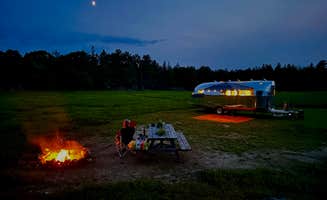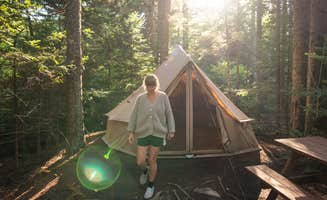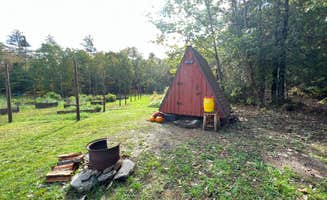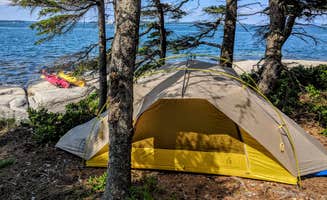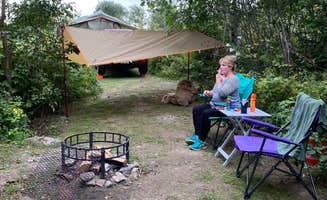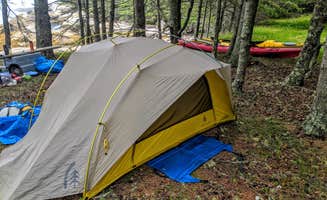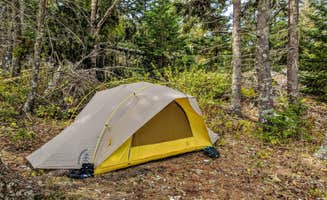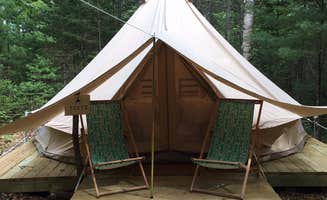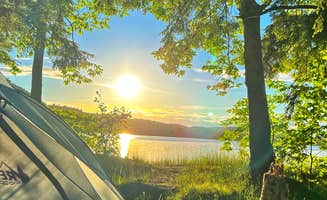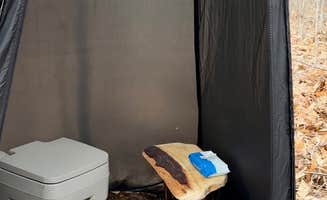Tent camping options near Searsport, Maine range from primitive island sites to farm-based campsites across the region. While summer daytime temperatures average 70-80°F, evening temperatures often drop into the 50s, requiring proper sleeping gear even in July and August. Several camping areas require advance preparation including water storage containers as drinking water access varies significantly across the region.
What to do
Beach exploration along coastlines: At Salt Pond Perfection, campers can swim in coastal waters during summer months. As one visitor noted, "We swam in the water everyday, and picked/ate the blueberries!" This waterfront access provides natural cooling during warmer summer days.
Blueberry picking in season: Visit Continuous Harmony Farm during late July to early August to experience Maine's wild blueberry season. "Chill out and watch the sheep, or pick your own blueberries alongside their raking crew in their organic wild blueberry barrens," according to one camper. Picking costs vary by volume.
Day hiking on Isle au Haut: From coastal campsites, paddlers can reach Duck Harbor on Isle au Haut (part of Acadia National Park) for day hikes. Paddlers staying on nearby islands recommend leaving early to maximize hiking time and account for changing weather conditions.
What campers like
Natural soundscapes: Campers appreciate the quiet environment at Nathan Island, where one visitor mentioned the island provides "beauty all around! With a deep, rocky shore, it's the perfect place to make dinner, watch the sunrise or set, and star gaze with no city lights or trees to obstruct your view."
Farm-based tent sites: Agricultural properties provide unique camping experiences. At Continuous Harmony Farm, a camper described the setting as "gorgeous, right next to a pond," noting that "the sites are not marked at all" and it operates on a first-come, first-served basis.
Natural privacy barriers: Some tent sites feature natural vegetation dividing camping spots. A visitor to Maine Wild Blueberry Bliss commented, "The land was quiet and peaceful - it is acres of blueberry fields, which create a special sense of being in nature. The site we were at had a nice tree, which framed the site."
What you should know
Water transportation requirements: Island campsites require watercraft access with proper planning. A camper at Saddleback Island advised that "the fog can roll in at any minute so come prepared with a chart, compass, bearings between islands/markers and a marine radio." Bringing navigation tools is essential, not optional.
Tide awareness for island access: Tides impact landing possibilities on coastal islands. Island visitors note "the tide in this area is significant (9-14 vertical feet), and landing at high tide is nearly impossible on Saddleback and many other islands." Tide charts should guide all island access planning.
Waste management systems: Island campers must bring waste management solutions. As one experienced paddler explained, "you are required to use Wag Bags instead of digging a cat hole to dispose of human waste." These are not typically provided at the sites.
Tips for camping with families
Pack extra weather protection: Maine coastal weather changes rapidly and can be significantly cooler than inland areas. Families should bring layers and rain gear regardless of forecast, as fog and coastal storms develop quickly.
Pre-establish backup locations: Due to first-come, first-served policies on many sites, having secondary options is crucial. At Four Acre Woods Campground, one visitor found "the sites are small and close together," making certain locations less ideal for families needing space.
Consider amenity levels carefully: Facilities vary greatly between locations. A camper at The Hawnets Nest appreciated that "accommodations include a cool A-Frame or bring-your-own Tent!" Check specific amenities before booking, especially when traveling with children.
Tips from RVers
Generator restrictions common: Many sites prohibit generator use to maintain natural quiet. At Maine Wild Blueberry Bliss, one RVer noted, "It is dry camping, with no hookups, and generators are not allowed," adding that "the land was quiet and peaceful" as a result.
Site dimensions may be limited: RVers should confirm exact site dimensions before booking. An RVer described Maine Wild Blueberry Bliss: "We stayed in campsite 2, where the land is open and flat, and there was plenty of room for our rv." Site-specific details matter for vehicle fit.
Waste disposal planning required: Most rustic sites lack dumping facilities. RVers should locate nearby dump stations in advance and plan tank capacity accordingly, as many coastal campgrounds operate with limited infrastructure.


